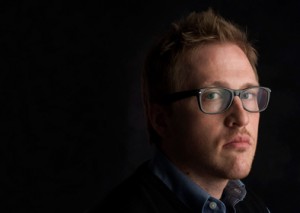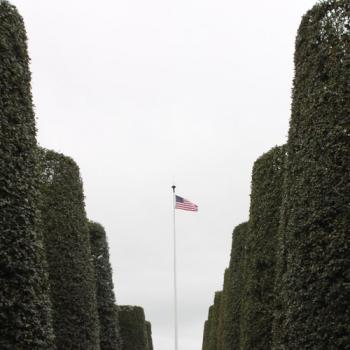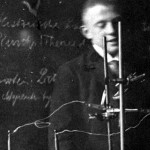 I’m guessing that most of you haven’t heard of Joshua Casteel—but you should have. Casteel passed away in August after a short battle with a very aggressive form of lung cancer. He was only thirty-two.
I’m guessing that most of you haven’t heard of Joshua Casteel—but you should have. Casteel passed away in August after a short battle with a very aggressive form of lung cancer. He was only thirty-two.
An Iraq war veteran, Casteel served as an interrogator at the notorious Abu Ghraib prison shortly after the abuse scandal rocked the US military. He worked to ferret out intelligence that would help US forces capture and kill al Qaeda kingpins and foil the plots of jihadists.
I met Joshua in South Bend, Indiana at a conference sponsored by the Catholic Peace Fellowship, an organization started by Jim Forest and Tom Cornell, both of whom worked closely with Dorothy Day in her ministry of hospitality to the homeless.
I remember sitting down at one of the long tables during the lunch break just as Joshua was being introduced. He had a bit of a hipster vibe about him—flannel shirt, beard and black glasses—but there was no irony or cynicism in his posture or his voice as he recited the Magnificat:
My soul proclaims the greatness of the Lord,
my spirit rejoices in God my Savior
for he has looked with favor on his lowly servant.
From this day all generations will call me blessed:
the Almighty has done great things for me,
and holy is his Name.
He has mercy on those who fear him
in every generation.
He has shown the strength of his arm,
he has scattered the proud in their conceit.
He has cast down the mighty from their thrones,
and has lifted up the lowly.
This is how he began. No introduction, just right into prayer. And as he prayed, I could see in his slightly upturned face and closed eyes that he meant it.
Afterward, he explained that it was through this prayer, and Mary’s intercession, that he underwent a conversion of heart that lead to him becoming a conscientious objector, eventually winning an honorable discharge from the Army.
He told the gym full of would-be pacifists—young and old—that the impetus for his soul-searching came when a young jihadist he was interrogating accused him of not being authentically Christian. The man pointed out what so many of us are taught as children, that when struck we should not seek revenge but offer the other cheek.
By the time of the conference, I had already completed work on my book about the Abu Ghraib scandal and so meeting Joshua was both refreshing and indicting. On the one hand, I was elated to meet a soldier who had stared the situation at Abu Ghraib and the larger Global War on Terror in the face and decided he could not/would not be complicit.
On the other hand, my book, though it came out of my own crisis of conscience spurred by the Abu Ghraib photos, seemed to pale in comparison to Casteel’s first-hand account. Listening, I felt some jealousy at the gift of faith he received; a selfish thought I tried hard to pray away.
Thankfully for me, Joshua was kind and humble, so that when I told him about my book, still with some jealousy in my heart and probably in my voice, he put me at ease. We agreed to talk after the conference.
That evening several of us gathered at the Catholic Peace Fellowship office, a beaten-down two-story house across from a vacant lot. We sat in the tiny living room and sipped wine out of plastic cups. I remember Joshua tipping back in a recliner talking about rap and techno music, about time spent in foreign ports—once or twice we went outside for a cigarette.
There was a lot I wanted to talk with Joshua about. He had recently begun an MFA program in playwriting at the University of Iowa, so I thought we might bond around that (I received my MFA four years previous), but what I really wanted to talk about were conditions in the prison—I had only gotten access to that information through the press.
But as intense, intellectually sharp, and devout as Joshua was, after a long day of talks by theologians and peace activists, and even a skit portraying the martyrdom of St. Marcellus (a centurion who refused to participate in the celebration of the emperor’s birthday), in which I had a small speaking part, he just wanted to relax and have a good time.
It was puzzling and frustrating to me at the time, but two years later, reading Letters From Abu Ghraib, a collection of emails written while stationed in Iraq to family and friends detailing each step of his conversion, I understood.
Reading that book—and re-reading now in light of his tragically premature death—I understand that he didn’t necessarily feel the need to talk endlessly about his experiences because his fierce and eloquent letters said it all. They create an essay on why he could no longer participate in the war, and why he wanted to become a priest—a vocation he was pursuing when diagnosed with cancer.
In 2004 he writes:
Dad, I don’t want a life of possessions. I don’t want a life filled with the many addictions and allegiances of civic life. I don’t want to be a Democrat. I don’t want to be a Republican. I don’t want to be an American, if that means forming my convictions and beliefs in accordance with something as mundane as dirt and committees and geopolitical interests. I belong to none of them…I want to submit to an authority that is not of myself, and I want to authentically “abandon all.”
Though I barely knew Joshua, when I read those words again in early September after learning he had died, I felt that twinge of jealousy again—oh, to be able to live so faithfully!
But this time, that jealousy was immediately struck down by the realization that Joshua had caused me to desire a richer faith, to strive for righteousness. And for that I am eternally grateful.











